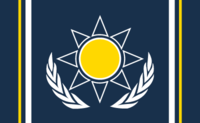User:PopeDaveThe3th
It is I, the pope, resident grammar fanatic and Sol Gov enthusiast.
Informal Names: TSF, SolGov
Capitol: Earth
Founding: July 14th, 2080
Residents: 87 billion est.
Languages: G. Common, Sol Common, Tradeband
Government: Stratocratic Federal Democracy
Current Grand Marshal: Samantha R. Daud
Currency: Credit
Market Focus: Mining, Plasma
Fleet: Corvettes (53), Civilian (32)
The Trans-Solar Federation is the galaxy’s leading superpower and is easily the largest interstellar nation in terms of both size and population, counting hundreds of systems and thousands of worlds under its command. Under its decentralized and federalist system, the Federation may be slow to fully awaken, but once ready, only the gods can hope to stand against its military and industrial might.
Summary
The Trans-Solar Federation, also known as the TSF or simply SolGov, is the primary human-majority nation today, and the de-facto superpower of the known galaxy. Primarily located in the Orion arm of the galactic South, the TSF is a network of hundreds of local system governments, each swearing loyalty and taxes to the federal government based in Sol.
Coming into being in the late twenty-second century, the entity that would become the TSF was created out of a union between several old Earth governments following the end of the Second Cold War. With Earth running low on critical resources, the newly-formed Solar Federation expanded quickly, colonizing the Solar system, and, once FTL travel was developed, beyond.
Today, the Federation stands as powerful as ever, its armies and fleets crossing the void alongside their Skrellian allies to bring order and light to stars known and unknown. While it may face challenges as any nation does, the men and women of the Trans-Solar Federation can march forward with pride, knowing that so long as Sol burns, the Federation will endure.
Abridged History 
Government & Politics
The Trans-Solar Federation practices a form of hybrid democracy known as Federal Stratocracy. Under this model, only those who have completed a requisite five or more years in either the nation’s civil or military service are permitted to vote or hold public office. Those who have completed their service become true Citizens, while those who have not are known as Civilians. While civilians retain similar legal and property rights to citizens, they are excluded from several government programs, and are ineligible for political participation. Due to the difficult and low-paying nature of federal service, civilians make up the majority of the Federation’s population, though this varies between member worlds.
The Federal government is made up of four separate branches: The Joint Chiefs, the Citizens’ Councils, the Civilian Assembly, and the Supreme Court.
The Joint Chiefs
The Joint Chiefs make up the executive of the Federation, with voting members consisting of the Navy Chief of Staff, the Commandant of the Marine Corps, the Army Chief of Staff, the Director of the Logistics Corps, the Secretary of Civil Affairs, and the Grand Marshal of the Federation. The Director of FAID, Commodore of the Merchant Marine, Sector Authority Commanders, and several other lesser functionaries also attend in advisory capacity. Members of the Joint Chiefs, with the exception of the Grand Marshal, do not have set terms, but are expected to retire when no longer fit for office. The Grand Marshal is selected by the Joint Chiefs from the Federal Military at large, excepting the Joint Chiefs themselves, who are not eligible for the office. The upcoming Grand Marshal must then be confirmed by both Councils before assuming office. The Grand Marshal serves for a single term of ten years.
The Joint Chiefs collectively determine the foreign policy goals and general direction of the Federation, with the Grand Marshal serving as a speaker and the Commander in Chief of the entire Federal military. The Joint Chiefs also possess the ability to veto legislation passed by both Citizen Councils and the Civilian Assembly, though either Citizen Council can overturn this veto with a 2/3s majority vote. Notably, the Grand Marshal is permitted to issue Emergency Orders in extreme situations where normal bureaucracy must be bypassed. The use of an Emergency Order is always reviewed once said crisis has concluded, however, and improper use of such an order may lead to a vote of no confidence.
The Citizens' Councils
Comprising two separate assemblies, Upper and Lower, the Citizens’ Councils provide political representation to the citizens of the Federation. The Upper Council provides equal representation to all member worlds, with two elected representatives per world. The Lower Council provides proportional representation, with each planet electing a number of representatives proportional to their population. Representatives in both councils serve for terms of five years, with a limit of two terms per representative.
The Councils are the primary legislative body of the Federation, with both Upper and Lower being able to put forth bills. Said bills must then be confirmed by both Councils, and the Civilian Assembly.
The Civilian Assembly
The Civilian Assembly: Providing representation to the civilian populace of the Federation, the Assembly operates similarly to the Upper Council, with each member world’s civilian populace electing a single representative to speak on their behalf. Civilian representatives serve for four years, with a limit of two terms.
Unlike the Councils, the Civilian Assembly is not permitted to propose legislation, instead only being able to vote for or against existing legislation moving through the Councils.
The Supreme Court
The highest court of the Federation, consisting of 15 appointed justices, selected by the Grand Marshal and confirmed by the Upper Council. Justices serve for life, with some exceptions, and are usually selected from members of the Federal military court system who have exhibited exceptionally honorable and apolitical conduct.

